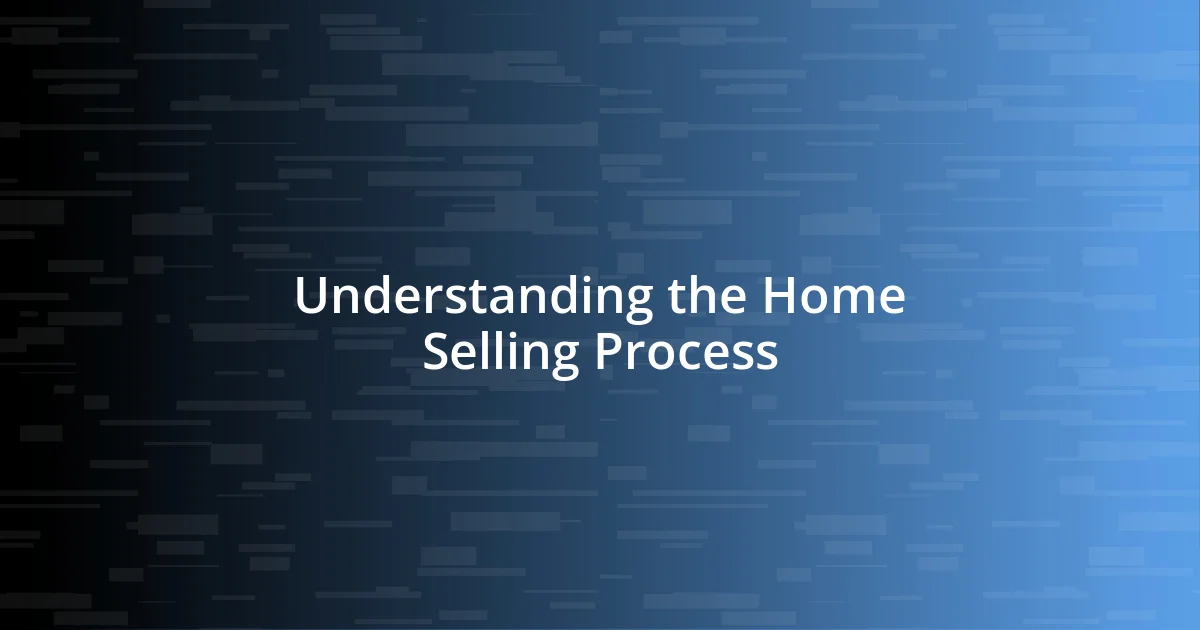Key takeaways:
- Prepare your home by decluttering, deep cleaning, staging, and enhancing curb appeal to create an inviting atmosphere for potential buyers.
- Price your home competitively by analyzing comparable sales, market trends, and home condition to reflect its true value and attract buyers.
- Communicate openly during negotiations, remain flexible with offers, and ensure clarity in closing documents to facilitate a smooth transaction.

Understanding the Home Selling Process
Understanding the home selling process can feel overwhelming, but breaking it down into smaller steps makes it more manageable. When I sold my first home, I remember feeling a mix of excitement and anxiety. It’s crucial to familiarize yourself with the markets, prepare your home, and set a competitive price—things that I learned the hard way after initially undervaluing my property.
Once you’ve laid the groundwork, the next step is to effectively market your home. I vividly recall hosting open houses, nervously watching potential buyers explore every corner. What struck me was how a little staging and a warm ambiance could transform the space, making it feel inviting and personal. Have you thought about how your home’s atmosphere could influence a buyer’s feelings? Creating an emotional connection can be just as important as the physical characteristics of your property.
Navigating negotiations can be challenging, especially if you’re attached to your home. I once encountered a buyer whose offer wasn’t what I expected; it stung at first. However, I realized that being open to discussions and understanding their perspective helped me gain insight into the buyer’s needs. How might this shift in mindset influence your own selling experience? Embracing the process can lead to valuable outcomes that you may not have initially considered.

Preparing Your Home for Sale
Preparing your home for sale is a crucial step that can significantly impact your sale’s success. I remember when I was getting my own place ready; I was surprised by how much a fresh coat of paint could breathe new life into the space. Simple updates not only elevated the appeal but also made me feel proud about showing it off to potential buyers.
To make your home shine, consider these essential tasks:
- Declutter: Remove personal items and excess furniture to create an inviting atmosphere.
- Deep Clean: Scrub every corner, including carpets and windows, to ensure everything sparkles.
- Stage Strategically: Arrange furniture to highlight the space and flow of your home.
- Enhance Curb Appeal: Don’t forget about the exterior—fresh landscaping and a clean entryway create a strong first impression.
- Minor Repairs: Fix leaky faucets and patch up any holes to show that the home is well-maintained.
Taking these steps not only prepares your home but also sets the stage for an emotional connection with buyers. When I took care of these details, I found that it became easier to visualize my home as a welcoming haven, enticing others to see it in the same light.

Pricing Your Home Competitively
Pricing your home competitively is a nuanced process that requires a keen understanding of your local market. I remember when I was determining the price for my property; I painstakingly analyzed recent sales in my neighborhood. This exploration was crucial because I learned that pricing too high can deter interested buyers while pricing too low might undervalue my investment. It’s all about finding that sweet spot.
One effective strategy I found helpful was to look at comparable properties—those similar in size, condition, and location. I spent hours browsing listings, taking notes on unique features and recent renovations. Wouldn’t it be easier if there was a systematic way to analyze these homes side-by-side? Here’s a breakdown of what to consider when pricing your home:
| Factor | Importance |
|---|---|
| Comparable Sales | Critical for market understanding |
| Home Condition | Influences buyer perceptions |
| Market Trends | Affects demand and pricing flexibility |
| Seasonality | Potential impact on buyer activity |
As I listed my home, I felt a wave of vulnerability yet excitement. The moment my agent suggested a competitive price based on thorough research, I felt a rush of relief. I realized that pricing your home is not just about numbers; it’s about telling a story that resonates with potential buyers. Setting a price that reflects my home’s true value while capturing buyers’ attention felt like crafting a delicate balance that could lead to a swift sale. How will you approach this pivotal step in your selling journey?

Marketing Strategies for Fast Sales
When it comes to marketing your home effectively, utilizing online platforms can be a game changer. I remember posting my home listing on social media and being amazed by how quickly it garnered interest. High-quality photos and engaging descriptions can create a buzz—wouldn’t you agree that a striking image can capture a viewer’s attention instantly? I found that showcasing unique features, like a cozy reading nook or a beautifully landscaped garden, made my listing stand out in a sea of posts.
Another strategy I found beneficial was hosting open houses. There’s something magical about inviting potential buyers into your space, allowing them to envision their future there. During my open house, I made sure to provide refreshments and a warm atmosphere. I sensed that this personal touch not only made visitors feel welcome but also highlighted the home’s inviting nature. It’s interesting how simple gestures can sway emotions—what small details do you think would resonate with your guests?
Don’t overlook the importance of leveraging local real estate agents. My agent provided invaluable insights into effective marketing strategies that tailored to our community’s needs. They knew the right channels to promote my listing and even organized targeted campaigns to reach interested buyers directly. I felt reassured knowing I had a partner who understood the market dynamics well. It’s fascinating how much impact an experienced agent can have in orchestrating a quick sale. Have you considered collaborating with a local expert to enhance your own selling efforts?

Staging Techniques to Impress Buyers
One of the most striking staging techniques I utilized was decluttering. I recall walking through my home and noticing how a few extra pieces of furniture made the space feel cramped. By removing items that I no longer used, I created a sense of openness that allowed potential buyers to visualize their own lives in those rooms. Isn’t it refreshing to see a home that feels airy and spacious instead of overwhelmed by personal belongings?
Another effective approach I discovered was to enhance lighting. I remember the first time I flipped on all the lights and opened the curtains during a showing. The home instantly transformed, showcasing its features and inviting an ambiance that felt warm and welcoming. I found that using strategically placed mirrors not only brightened the rooms but also made them appear larger. How do you think the right lighting can impact a buyer’s emotional connection to a space?
Focusing on the senses while staging can make a world of difference. For example, I baked cookies before a showing, and the delightful aroma wafting through the air created an almost homey vibe. Potential buyers often lingered longer, and I could see them imagining themselves hosting gatherings in the kitchen. It’s amazing how simple scents or the right melodies playing softly can evoke feelings of comfort, isn’t it? What sensory touches would you consider adding to your staging strategy?

Negotiating Offers Effectively
Negotiating offers can often feel like a delicate dance, but I learned that clarity and confidence can significantly enhance the process. When I received an initial offer on my home, instead of immediately accepting or rejecting it, I took time to analyze the terms and how they aligned with my goals. After all, don’t you think understanding your bottom line is crucial before diving into negotiations?
What truly made a difference for me was being open and communicative with potential buyers. I remember one instance where a buyer seemed hesitant about the offer they submitted. Rather than pushing them right away, I asked them what their concerns were. This simple question opened up a dialogue that not only clarified their expectations but also allowed me to present counteroffers that were more appealing to both parties. It felt empowering to work collaboratively rather than adversarially—doesn’t that approach foster better relationships?
Another strategy that proved invaluable was reminding myself to stay flexible during negotiations. I realized that being too rigid could close off potential opportunities. Once, I was faced with an offer slightly lower than my asking price, and instead of dismissing it outright, I countered with a creative solution, such as including certain appliances. This not only kept the dialogue going but also satisfied both the buyer and me. How do you think flexibility can open up pathways in your own negotiations?

Closing the Sale Smoothly
After you’ve gone through the often-overlooked stages of your home sale, the closing process should feel like a culmination of your efforts. I vividly remember the day I entered the closing meeting, feeling the mixture of excitement and nerves bubbling within me. It dawned on me how vital it was to come prepared with all necessary documents and be fully aware of what to expect. Don’t you find a little organization can go a long way in easing that closing-day tension?
One of the standout moments for me was when I took the time to connect personally with the buyers before signing. Sharing a little bit about my memories in the home made the experience warmer and more relatable. I could see them starting to visualize their new life there, which made it feel less like a transaction and more like a transition. Have you ever considered how the emotional aspect can influence a sale’s outcome?
Lastly, I can’t stress enough the importance of clarity in the final steps. The closing documents can seem like a sea of legal jargon, but I made it a point to read through everything carefully, asking questions as they arose. One time, I caught a small mistake in the paperwork that could have led to complications down the line. It’s a classic case of “better safe than sorry.” How do you prioritize understanding the details in such crucial moments?














